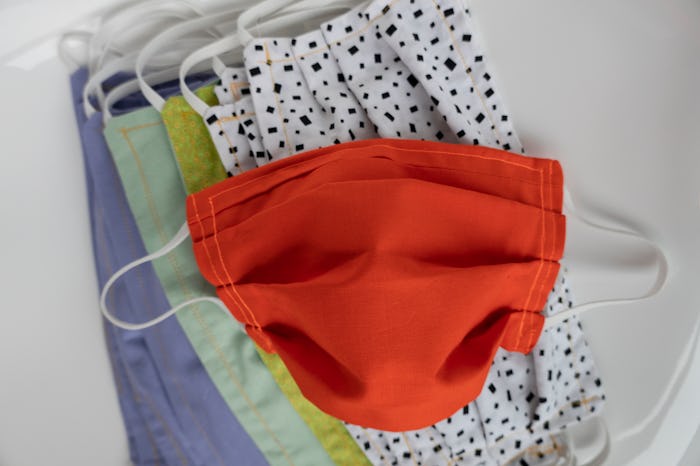News

CDC May Soon Recommend Wearing Cloth Face Masks During Coronavirus
Roughly a month after the U.S. Surgeon General urged Americans to stop buying face masks, President Donald Trump announced that the White House will soon release new recommendations for wearing face coverings amid the growing coronavirus pandemic. So with what public health officials now know about COVID-19, the disease caused by the novel coronavirus, should you be wearing a face mask out in public?
Updated guidance from the White House and public health officials, which is expected to be released in a few days, will reportedly refer to cloth face masks or face coverings — not disposable surgical masks or N95 respirators healthcare workers depend on and are currently in short supply — according to The Washington Post.
Currently, the Centers for Disease Control and Prevention (CDC) states that people who are not sick "do not need to wear a face mask" unless they are caring for someone who is sick and that person is not able to wear a mask themselves.
However, as there are concerns that people who are not displaying symptoms for COVID-19 could be spreading the disease, The Washington Post reported, citing an internal memo, that the CDC may update these guidelines. "In light of these new data, along with evidence of widespread transmission in communities across the country, CDC recommends the community use of cloth masks as an additional public health measure people can take to prevent the spread of virus to those around them,” the CDC's updated guidance reportedly says, according to The Washington Post. Trump said during a recent White House coronavirus task force briefing that he didn't think it'd be a "mandatory" measure, CNN reported.
Additionally, Dr. Anthony Fauci, the director of the National Institute of Allergy and Infectious Diseases, told CNN's Jim Acosta earlier this week that "one of the best ways" to prevent infecting others is to wear a mask. "Because if, in fact, a person who may or may not be infected wants to prevent infecting someone else, one of the best ways to do that is with a mask, so perhaps that's the way to go," he said.
Dr. Deborah Birx, White House coronavirus response coordinator, stressed that if people decide to wear face coverings moving forward, they still need to continue practicing social distancing and frequent hand-washing. "The most important thing is the social distancing and washing your hands," Birx said at a press briefing. "And we don’t want people to get an artificial sense of protection because they’re behind a mask. Because if they’re touching things — remember your eyes are not in the mask — so if you’re touching things and then touching your eyes, you're exposing yourself in the same way."
While a nationwide recommendation hasn't been released, Mayor Bill de Blasio issued a new guidance on Thursday for New York City, one of the hardest hit areas, advising people to "wear a face covering when you go outside and near others," as an added layer of protection in addition to social distancing guidelines.
The covering, according to de Blasio, "can be a scarf, a bandana or one you make at home." He stressed that medical masks should be saved for healthcare workers and first responders "who truly need them."
On Feb. 29 — when there were 87,000 confirmed cases of COVID-19 globally; there are now over 896,000 confirmed cases and over 72,800 deaths — Surgeon General Dr. Jerome Adams wrote on Twitter that Americans should "STOP BUYING MASKS!" as "they are NOT effective in preventing general public from catching #Coronavirus." He added that "if healthcare providers can't get them to care for sick patients, it puts them and our communities at risk!" Fauci also stressed this week that maintaining mask supply for healthcare workers is essential.
On April 2, Adams wrote on Twitter that "there remains scant evidence wearing a mask — especially improperly — provides much benefit to a healthy wearer." But he added that "emerging data suggests facial coverings may prevent asymptomatic disease transmission to others."
So, do you need to wear a mask? According to the World Health Organization (WHO), you should if the following applies to you:
- If you are coughing and sneezing
- If you are healthy and taking care of something who is, or is suspected to be, infected with the new coronavirus
COVID-19 is a respiratory disease that is primarily spread "through droplets generated when an infected person coughs or sneezes, or through droplets of saliva or discharge from the nose," according to WHO.
WHO stresses that face masks are only effective "when used in combination with frequent hand-cleaning with alcohol-based hand rub or soap and water." As for the CDC, the agency has said that "you may need to improvise a face mask using a scarf or bandana" during a pandemic like this as face masks "may be reserved for healthcare workers."
So until more concrete guidelines are released in the coming days, continue to wash your hands, practice social distancing, stay home as much as possible, and consider making your own coronavirus face mask. According to 2013 research published in the Disaster Medicine and Public Health Preparedness that focused on influenza, pillowcases and 100% cotton t-shirts were found to be the "most suitable household materials for an improvised face mask," though researchers noted that homemade masks only offer limited protection but "would be better than no protection."
If you think you’re showing symptoms of coronavirus, which include fever, shortness of breath, and cough, call your doctor before going to get tested. If you’re anxious about the virus’s spread in your community, visit the CDC for up-to-date information and resources, or seek out mental health support. You can find all of Romper’s parents + coronavirus coverage here, and Bustle’s constantly updated, general “what to know about coronavirus” here.